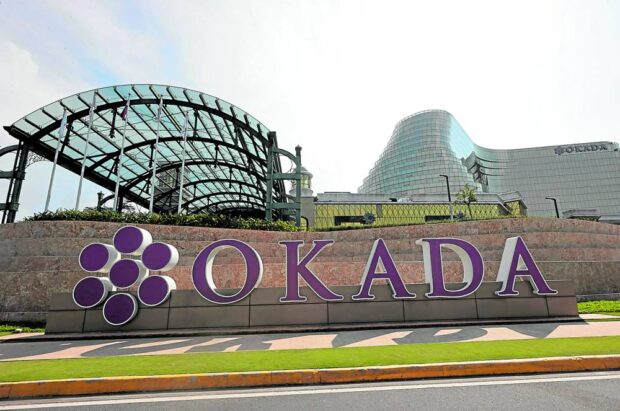Japanese tycoon loses control over Okada Manila

GAME OVER | Japanese gaming tycoon Kazuo Okada fails to retake the $2-billion Okada Manila casino-hotel complex in Parañaque City after losing his case in the Supreme Court. (Photo by GRIG C. MONTEGRANDE / Philippine Daily Inquirer)
MANILA, Philippines — Japanese gaming tycoon Kazuo Okada has lost control over the $2-billion Okada Manila integrated hotel and casino in Parañaque City after the Supreme Court lifted the status quo ante order (SQAO) it issued in April 2022 that temporarily reinstated him as a shareholder, director, chair and chief executive officer (CEO) of the corporation running the establishment.
In a 14-page resolution made available to the public on Tuesday, the high court’s First Division dismissed Kazuo’s complaint challenging the legality of his removal from Tiger Resort, Leisure & Entertainment Inc. (TRLEI), which operates Okada Manila, for finding no merit in the petition.
“It found that the allegations and the reliefs sought in Kazuo’s complaint [at the regional trial court] clearly show that it is an action for election contest and was, thus, subject to the 15-day prescriptive period under the Interim Rules of Procedure for Intra-Corporate Controversies,” the Supreme Court said.
“The records show, however, that the complaint was filed on Aug. 29, 2018, or more than one year after the conduct of the June 16, 2017, special stockholders’ meeting where the elections for the removal and the replacement of Kazuo as director, chairperson and CEO of TRLEI were held,” it added.
READ: Noel Bazaar ushers in holiday shopping season at Okada Manila
Properly removed
Even assuming that the complaint could be treated as a case for reconveyance of shares of stocks, the Supreme Court ruled that Kazuo was properly removed as a TRLEI official.
It said the evidence submitted by the Court of Appeals (CA), which it had tasked to look into the Okada group’s ownership and control dispute, established that Kazuo had no cause of action because he was merely a nominal shareholder in TRLEI and had no control over Okada Holdings Ltd. (OHL) and its subsidiaries.
The high court noted that the one share registered in Kazuo’s name in TRLEI’s General Information Sheet as of May 2017 was merely a nominal share under a deed of assignment issued by Tiger Resort Asia Ltd. (TRAL), TRLEI’s parent company and an OHL subsidiary.
However, the deed of assignment had been revoked by TRAL in June 2017, resulting in the cancellation of Kazuo’s stock certificate in TRLEI.
Ownership dispute
“Kazuo failed to prove that he was indeed the owner of the subject share. Thus, there are no shares of stock in TRLEI that Kazuo can legally and properly recover in this case,” the Supreme Court pointed out.
In his petition at the Supreme Court, Kazuo had prayed for the issuance of an ex parte temporary mandatory injunction and/or temporary restraining order, arguing, among others, that his complaint was not an election contest as he was assailing his illegal removal as TRLEI’s stockholder, which was anchored on his claim of majority ownership of OHL, the ultimate parent company of TRLEI.
Kazuo cited two pending cases before the Chiba District Court in Japan where he sought to be declared as the true legal and/or beneficial owner of the majority of the OHL shares.
On April 27, 2022, the Supreme Court granted Kazuo’s prayer and issued the SQAO, which literally translates to “the way things were before.”
On May 31, 2022, Okada’s camp, led by former Okada Manila board member and businessman Antonio “Tonyboy” Cojuangco, used the SQAO to take physical control of the casino-hotel complex in Parañaque City with the assistance of private security guards and local police.
TRLEI moved for reconsideration, maintaining that the issuance of the Supreme Court order interfered with and rendered nugatory the court decisions in Japan and Hong Kong, which allegedly ruled that Kazuo had no control over OHL.
On Aug. 10, 2022, the high court resolved to reject the procedural arguments raised by TRLEI, and held that the SQAO was properly issued in accordance with law and jurisprudence.
Presumptive evidence
The high tribunal, however, ordered the CA to conduct proceedings to get evidence of the facts related to the ownership dispute.
Among the evidence the CA was tasked to receive included the propriety of maintaining the SQAO in view of the alleged mismanagement of TRLEI after Kazuo was ousted, and any factual matters in determining the propriety of the regional trial court’s earlier dismissal of Kazuo’s complaint.
The appellate court was also tasked by the Supreme Court to determine the existence, authenticity, and accuracy of the translations of the alleged decisions of the Japanese and Hong Kong courts that were invoked by TRLEI, allegedly saying that Kazuo was not the controlling stockholder of OHL.
Citing Section 48, Rule 39 of the Rules of Court, the Supreme Court said that a judgment or final order of a competent foreign tribunal may be given effect its jurisdiction provided that the party invoking the foreign judgment or order proves the same as a fact.
“In recognizing foreign judgments or orders, Philippine courts exercise limited review and do not delve into the merits of the same,” it said.
The Supreme Court added that the existence and authenticity of the foreign judgments and its translations have been duly proved as stated in the CA report.
“Notably, the rules are silent as to what initiatory procedure must be undertaken in order to enforce a foreign judgment in the Philippines. As such, the foreign judgments may now be considered by this Court as presumptive evidence…” it noted.